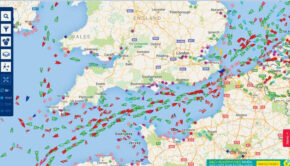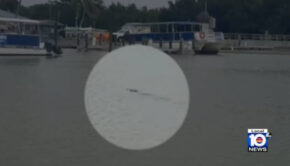Sharing memories of boating conflict
Published on August 21st, 2020
Following the story, When powerboats and sailboats meet, Scuttlebutt received many similar stories…here’s a sampling:
In my 50 years of sailing I have not had any close calls (touch wood!) but we are constantly puzzled by the procedure power boaters utilize to over take a stand on sailing vessel on the same course.
We normally give power boats a wide berth and give them a straight line channel marker to channel marker course by passing us on our stern, but 99% will travel in a huge arc out of their way to cross our stern and then come back and cross our bow to get to the next mark??? It usually leaves our rigging and heads shaking wondering why.
We call it the “PB Coriolis Effect” which is usually prefaced with a string salty sailor adjectives. 😉
– Denis McGee
While sailing singlehanded across the Atlantic in a 28 foot trimaran, I was about 3 days out of Newport (this was some time ago) when woken up from a nap by the autohelm beeping that it couldn’t keep course (very light winds and the boat had gybed). I was moving towards the hatch to sort it out when I heard the deep pounding of a ship.
I put my head out and there was this huge bow directly over me. I had no way on and no real way to steer away. Luckily the ship missed by no more than 50 feet and I was rocked violently from side to side.
I grabbed the VHF and looked up at the bridge to see a number of faces looking down at me. In the subsequent conversation it turned out that they had altered course to “come and look at me”! “Just came across to say hello.” Not sure the friendliness was welcomed…
– Adriaan Brink
The problem with uneducated powerboaters has gotten to the point on the Manatee River here in Florida that I no longer sail a small boat on the weekends.
I’ve had a 60’+ powerboat on a full plane in open water overtaking me and blowing his horn for me to get out of the way. I’ve been hit by a 20’+ center console on a semi-plane because both occupants were looking at their motor, rather than where they were going. I’ve been yelled at by a powerboater who thought he had the right of way in open water. The list goes on…
For these reasons, I am now of the opinion that a license, similar to a driver’s license should now be required to operate a boat with more than 25hp of power. Right now there are too many boats, too much horespower, with way too much operator ignorance.
– Peter Wormwood
We were approaching the starting in a NYYC regatta aboard the 6-Meter Cherokee, about to make a great start, when we realized a big Nordhaven powerboat was on our course, and moving fast.
I recall seeing its bow bulb approaching our starboard side, thinking it would punch an 18-inch hole in the boat, and we’d go straight to the bottom. My girlfriend Trisha McElroy was on the bow and jumped into the water.
Fortunately the Nordhaven went into reverse and stopped, but not before taking out our forestay. Then they just took off, even before Trisha was pulled out of the water. Must have had a lunch reservation….
– Michael de Angeli; Jamestown, RI
A favorite story, shared by a friend, recounts an Optimist dinghy regatta in northern Hillsborough Bay, Florida. Approximately 60 junior sailors were happily racing around their modified Olympic triangle in the middle of a Saturday afternoon, in clear weather and away from any navigational marks or channels, when the weather mark boat operator spotted a 35 foot express cruiser headed directly for the middle of the fleet at 20 knots.
The committee boat raced to intercept after unsuccessfully attempting to raise the “captain” of the vessel on the VHF, and after managing to coral the powerboat, it was explained that the fleet of boats on his bow were children competing in a race and asked if he might throttle down and proceed around rather than through the course.
His angry reply? “But they’re on my magenta line!” (Referring to the track on his 15 inch GPS screen.) You just can’t make this stuff up.
– JA Booker; Davis Island Yacht Club
When you see red and green approaching, do not turn left, especially if the lights are above your spreaders. The approaching freighter probably knows it is passing port-to-port but not going to run you over. Scary but stay on or veer to starboard. Been there, done that, many times.
– Christy Schisler
Fortunately, this isn’t a story of a dangerous close call with a powerboat but rather a humorous episode that occurred during a blind sailing regatta in Boston some 20 years ago. There were teams of blind sailors and sighted guides racing in Boston Harbor on J/22s from the Courageous Sailing Center in Charlestown.
During one race I was on the helm of a J/22 as we sailed upwind on port tack, on a potential collision course with a passenger ferry that was approaching from starboard. As our courses converged ever closer, my sighted tactician thought to himself, “He (meaning me) should be bearing off to avoid that ferry.”
As the distances continued to shrink the realization finally dawned on him that it was his job to tell me to bear off since I obviously couldn’t see the ferry. This he did and disaster was easily averted. I’d like to think that I may have been steering the sailboat well enough that my sighted tactician momentarily forgot that I was visually impaired.
– Duane Farrar; Watertown, MA
My wife and I, and another couple, were sailing back from Provincetown to Marblehead in the middle of Cape Cod Bay in what I call sporty conditions, 20+ knots. We were alternating helms every two hours and it was my turn to drive. Sailing along nicely on starboard tack with a reefed main and small headsail, I noticed a large white sport fisherman (35 feet plus) coming towards us off our port bow.
I could tell that the crossing was going to be close and the sport fisherman was closing FAST, and while my first thought was that they would see us, a couple seconds later I said, “HOLY S#@T!”
Needing to bear off, and with us close hauled in the strong breeze, I also had to ask to have the main eased out QUICKLY because the helm was loaded up. The sport fisherman went by, with NO ONE at the helm, or anyone on lookout. “WOW,” I said afterwards. Too close for comfort.
– Tom Anderson; Marblehead, MA
Back in the early 1980s, I was sailing off the coast of Southeast Florida, well out of sight of land, when off in the distance, I see a Miami Vice cigarette-type offshore racing speed boat headed my way.
They were coming from the Bahamas, and I was quite concerned as there were a lot of improprieties and dangerous activities back then in those waters with drug smuggling. So I get out right scarred when this boat comes right up to me and stops, with the guy at the helm shouting out, “Hey, which way to Ft. Lauderdale?”
All that money to buy an expensive boat, and no knowledge how to navigate. I was the only boat in sight, so I guess he figures that the sailboat he sees on the horizon would know where he’s at. All I did was point in the general direction, and they sped away, with me still in a state of shock.
– Allan Glick
On Lake Ontario, the bane of my sailing existence is fishing boats. These powered vessels believe, without fail, to a one, that they have right of way over a sailing vessel. But they do not fall under the definition of a fishing vessel. They are trolling. Not trawling. They are not restricted in their ability to maneuver nor do they display the proper day symbol for a vessel fishing. But someone, somewhere, told these guys that a sailboat gives way to a fishing boat. They just never bothered to read all the Col Regs.
– Steve Moll
We were Northbound toward the Pell Bridge outside of Newport Harbor, close hauled on a port tack (Bristol 27, engine not working). A big sailboat, under power, was on a collision course. He didn’t answer the radio, so I sounded the airhorn. The sole occupant’s head popped up the companionway to have a look around. He saw us, and changed course to pass ahead of us. He was under power, entering Newport Harbor, on autopilot, with no lookout, on a busy August weekend.
– Clay Commons; Portsmouth, RI
I live in Hong Kong, where all pleasure vessel operators are required to hold a Pleasure Vessel Operator’s Certificate of Competency. Grade II takes you up to 45ft, Grade I is unlimited. The license is widely criticized for being a paper exam only, and not requiring any practical demonstration of ability to drive, control, or berth your newly-acquired pride and joy.
Recently, I quizzed an insurance broker concerning premium discounts for holders of qualifications over and above the local ‘mud ticket’. Imagine my surprise when he pointed out that Hong Kong is in a very small minority in requiring any licensing at all!
Beyond a dinghy (we can discuss specifics some other time), everyone in charge of a boat, or driving a boat, should be required to take a test and carry a license.
– Guy Nowell, Editor, Sail-World Asia
This isn’t about one particular encounter, but many we’ve had since sailing the east coast and are now moored in Lake Michigan.
While in the Atlantic, we always kept a wary eye on motored vessels (esp the sea monster cargo vessels), but the Great Lakes have proved to be a completely different beast as we notice almost no understanding of right-of-way or overtaking vessel or power defer to a vessel under sail.
In the Great Lakes, we just watch out for all vessels, bearing off as needed. We don’t get angry about it… it’s just lack of knowledge. That is of course except for those times when the weekenders circle you with their girlfriends to just say hello and wake us to death!
– Brad Peek
There were five of us on a C&C 26 in Western Long Island Sound on a near windless but sunny, clear, and calm day. We were just slatting about and waiting for some wind when we saw a sailboat to the south. I’m guessing she was about a 40-foot yawl, under power, and headed straight at our beam.
At first we weren’t concerned, figuring she would change course but as she got closer we realized there was nobody at the helm. In fact there was nobody visible at all, and we realized she must be on autopilot.
My sister dived to get the ignition key and start the engine as I grabbed an air horn and we began screaming. However, there was not going to be enough time to get the engine started to get any way on, and as she headed for our midship, I was gauging which way to tell our companions to jump.
But at the very last moment we saw a head pop up from the cabin. He scrambled back to the wheel and took her hard to port missing us by just a few feet. The operator of the craft must have been embarrassed because he never even looked back at us.
– Bob Taffet; New York
Not only does a kayak deal with the world of power boats, but we also have to deal with the world of sailboats. It is my experience that both groups have their fair share of people who should not be at the helm.
– Joan Ellis
It was in the late 1970s, and I was sailing my beautiful old wooden sloop Runa to Block Island from my home port of Jamestown, RI. The trip started uneventfully, but as we neared Point Judith, really dense fog began rolling in despite a clear forecast.
No problem, Point Judith’s Harbor of Refuge was designed for just such an event, so we ducked in while we could still see the harbor entrance. Since it was clear we were in for an extended delay, it was an easy decision to just anchor, enjoy the solitude, have a nice dinner and try and get an early start the next morning.
While relaxing in the cockpit, feeling so glad we weren’t in danger of running into anything, with our anchor light displayed, I heard the unmistakable sound of large diesels heading my way. On and on it came, and I made a mad dash below for the air horn, which in that era was something you actually blew into with actual air from your lungs.
I hyperventilated, but couldn’t make enough noise to drown out the diesels, and at the proverbial last second, a 45-foot sportfishing boat on full plane came into view just off my stern. The skipper killed the throttles and the boat stopped within a boat length of what would have been a disastrous collision.
Ignoring his own wake that was causing my boat to pitch violently, he yelled “Hey buddy, is this Block Island?” Momentarily speechless, I just pointed the other way, and he roared off again on full plane. Another ration of grog was immediately served.
– Dennis Nixon
Many years ago, while out for a night sail on Lake Saint Clair on my 17-foot sailboat (proper navigation lights, of course), the sweep of a spotlight came across my sails. We turned on the powerful flashlight we always carried to light up our sails at night if we heard another boat nearby, and soon heard the sound of an outboard motor. Since it was dark and a little foggy, we were concerned and desperately hoping the powerboat spotted us and would avoid us.
A few moments later, an open powerboat of about 18-feet pulled up alongside and the skipper asked if we knew where Metro Beach was. This was long before GPS and widespread use of Loran, so I responded with the obvious question: Do you have a compass? Response: No. Next question: Do you have a chart? Response: Again, no. Hmmm. We had both, and knew exactly where we were.
Metro Beach was about two miles away, but instead of pointing them in the right direction, I told them that we were heading there, and they could follow us (us under sail, of course)! They did so, perhaps half grudgingly and half thankfully, at about 3 knots.
From about a half mile out, we could see the lights on shore, but in a moment of ‘maybe I should teach them a lesson’, I never announced that it was up ahead. Instead, I proceeded toward shore and up the channel, still at 3 knots, to the docks and ramp, and finally announced to them: “We are here.” Hopefully they never went out so unprepared, or at least never again ventured out at night.
– Gordie Couture; Lake Saint Clair, MI
To respond to Joan Ellis, I’ve met virtually zero kayakers who know the rules of the road. They assume since they are human powered, they’ve the right of way. In all encounters with boats under sail, except in some theoretical situation where they cannot maneuver or the clear case when the sailboat is the overtaking vessel, under COLREGS kayaks do not have right of way.
– David Miller









 We’ll keep your information safe.
We’ll keep your information safe.